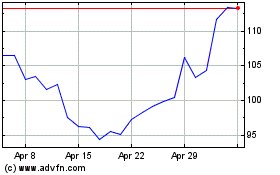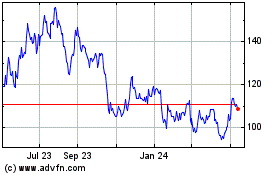Chinese Province Aims to Lead Big Data Charge
May 24 2016 - 12:48PM
Dow Jones News
By Eva Dou and Yang Jie
GUIYANG, China -- The chief executives of major high-tech
companies met China's premier on Tuesday against an unusual
backdrop: one of China's poorest provinces.
The high-tech convocation in Guizhou, a province better known
for producing fertilizer and liquor, is a measure of the Chinese
government's desire to bring technology investment to its
less-developed interior. While China boasts globally competitive
high-tech clusters on its economically developed east coast, inland
provinces largely lag behind in manufacturing and other traditional
industries, let alone more cutting-edge fields.
On Tuesday, China's Premier Li Keqiang and senior ministers
gathered foreign and Chinese high-tech executives in the capital of
Guizhou to stump for the goal of building a big data industry. Big
data is a hot computing field that involves crunching the massive
amounts of data collected by Internet companies to discover trends.
Guizhou wants to attract everything from the server farms that
store the data to the engineers that design programs to sift
through the information.
"The western region is not very developed, but there is
intelligence growing here," said Mr. Li, according to a video
reviewed by The Wall Street Journal. "I encourage all of you,
including foreign colleagues, to work together to foster new
development of the big data sector."
Beijing's plans and backing count for much in China's heavily
government-directed economy, so the prospect of a meeting with the
Chinese premier drew the chief executives of multinationals
including Dell Inc. and Foxconn Technology Group, which makes
iPhones and other products in China. The heads of top Chinese tech
companies also attended, including messaging and gaming giant
Tencent Holdings Ltd., search provider Baidu Inc., chip maker
Tsinghua Unigroup and ride-hailing service provider Didi Chuxing
Technology Inc.
Guizhou's big data conference, which opens Wednesday, is its
second annual event. The province has been trying to sell itself as
an ideal location, given its plentiful amounts of water and coal
for energy, a mild climate and lower land and labor costs than many
other parts of China.
Luring a big-data industry would mark a big step up for Guizhou,
a region of mountains and isolated hollows. The province's top
three exports are fertilizer, tires and liquor -- the famous
Chinese Maotai liquor comes from Guizhou. It routinely ranks near
the bottom of all China's provinces and regions for literacy and
income. Provincial economic output per capita last year stood at
29,847 yuan ($4,553), less than two-thirds of the national average
of 52,000 yuan.
Big data is a relatively new field for China. According to a
Bain & Co. report, spending on one part of it -- cloud
computing -- is growing by as much as 45% annually and is projected
to be a $20 billion business by 2020. In competing for investment
Guizhou is going up against eastern metropolises like Beijing and
Shenzhen, which have fostered high-tech industries for two or more
decades.
Guizhou is offering tax breaks, grants and housing allowances to
attract tech firms. Heeding the call so far is Tsinghua Unigroup, a
subsidiary of which has invested in a cloud-computing platform, and
U.S. network tech firm Qualcomm Inc., which set up a $280 million
joint venture to develop chips for servers in January.
The province reported this year that its big data "industrial
value" was 200 billion yuan, with a target of a 25% increase this
year, although it isn't clear how the figure was calculated.
Guizhou also requires a company only to be registered in the
province, not to set up physical facilities, so it is unclear how
much the value is produced there.
Tuesday's gathering appeared designed to show Guizhou's interest
in international partnerships. In an unusual setup for a Chinese
official meeting, Dell founder Michael Dell served as moderator and
sat beside Mr. Li onstage, according to a video of the event.
Foxconn Chairman Terry Gou and Tencent's chairman, Pony Ma, were
among the six executives each invited to give a six-minute speech,
according to a copy of the schedule.
Write to Eva Dou at eva.dou@wsj.com
(END) Dow Jones Newswires
May 24, 2016 12:33 ET (16:33 GMT)
Copyright (c) 2016 Dow Jones & Company, Inc.
Baidu (NASDAQ:BIDU)
Historical Stock Chart
From Mar 2024 to Apr 2024

Baidu (NASDAQ:BIDU)
Historical Stock Chart
From Apr 2023 to Apr 2024
